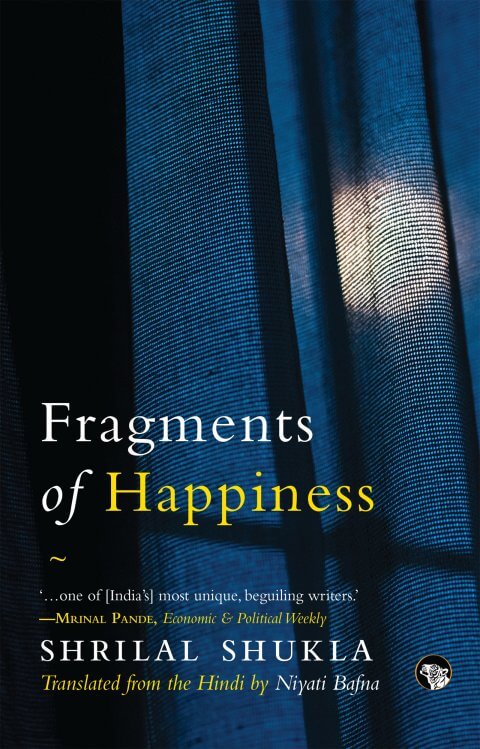Originally published in Hindi in 1973 as Seemayein Tootati Hain, Shrilal Shukla’s Fragments of Happiness, translated by Niyati Bafna is a tale of helplessness that impinges on ordinary lives in the face of unexpected circumstances. Shrilal Shukla’s world is multiple and vivid, and yet rooted in material realities. Delicately balancing complex concerns like love, crime, loyalty and faith, this book establishes Shukla as a powerful writer of tragedy and satire.
Following is an excerpt from the book.

Dimly locating each other’s figures, they gradually struck up conversation. Shankar shied away from any mention of the SupremeCourt’s decision: he attempted to distract Taranath from the already-distressing situation at hand with small talk. But he realized thatTaranath himself wouldn’t let his emotions be; he would begin to ponder, slowly, over the complications that would arise within hisfamily due to this decision. And, then, finally, conclude: ‘God’s will will be done!’
When Taranath spoke this way, Shankar would often pity him—in the same way as one pitied a sensitive boy whose father had diedof polio. ‘You won’t blame your God, then— even in these circumstances?’
‘What’s happened with us has happened to thousands of people. It’s the common currency of life. What’s to blame God with!’
‘You don’t feel that your God has let you down?’
Silence. ‘You want to beat my God up with the Supreme Court’s verdict?’
Shankar drank, without a word.
‘I needed a prop in my loneliness; I still do,’ Taranath said. ‘Now more than ever. I found it in the faith of my religion. This,too, you have a problem with?’
‘Not at all,’ Shankar replied. ‘I’m just wondering why more people today—in the twentieth century—don’t discover such an easysolution to their loneliness.’
‘It’s not an easy solution. Those who want the easy way out set out in search of lovers, get married, bury themselves in a crowd inorder to cheat solitude. But that’s a trick, not an answer. My way is difficult, because it doesn’t seek to cheat solitude but toseparate it from another, much larger loneliness…even in the twentieth century, this road is still open. Even today, it attracts millionsof people. You stayed in Europe this year, didn’t you? Unemployment and instability increased there after World War II, but did you findno one, in this new generation, in search of faith? Did you see no hope, no eagerness to seek?’
‘I did. But I was not satisfied. I don’t know how much of it was sincere and how much just show…and sometimes it was clear that this,too, was just an escape route. All in all, I found these pursuits, this race to discover religion, regressive—not consisting, in today’s times,of any practical utility.’
‘Now I need to see your face.’ Taranath switched on the lights of the veranda, and then returned slowly to the sofa, saying, ‘Religious beliefhas never had any practical utility, in the manner which you mean. Forget religious conceptions— people from the medieval ages had theirconceptions of heaven and hell to inspire them, as well as temptations of money and pleasure. I remember that when I was a child,a priest in the neighbourhood, who had been poor his entire life, used to chant an incantation that asked for chariots, elephants, horses,buffaloes with milk, vast palaces and servants, land and other luxuries. God knows where he would’ve parked his elephants and horses andbuffaloes in Delhi! Anyway, my point was that it’s definitely this kind of greed that has driven religion at one level—I also know that thesemedieval ideas are to some extent still the foundation of religious belief. But if my faith, in fact, had centred around them, yesterday’s verdictwould definitely have been a fatal shock.’
‘So, you want nothing from God?’
‘Sometimes I do. But that’s just the inconsistency of my mind, my desires. The truth is that ceremonious forms of worship—bothits “utilitarian” and “non-utilitarian” forms— in their traditional meanings have become meaningless to me. My faith is utilitarian insome way, but it doesn’t demand the fulfillment of all my immediate needs. All it asks is that I be uplifted from my loneliness, from thehelplessness that makes me stumble at each step that I take in the face of this destiny. My faith doesn’t grant me worldly successes— ordinary or extraordinary; it gives me the strength to reconcile myself to the failures and whims of life as its givens…by making methe object of mercy of the all-powerful, it rescues me from the sludge of self-pity.’
Shankar was listening carefully to this speech. He said, in English, ‘But can’t this be attained also by a little patience, a balancedapproach to life? It’s just a matter of controlling one’s habits. Why is it necessary to make it so mysterious, to resort to the idea of thesupernatural?’
‘If you can travel by a different path to the contentment of the soul, then by all means do so. Perhaps we’ll realize later that our pathswere essentially one.’
Shankar started laughing loudly. ‘This is exactly the kind of mystical approach I’m scared of. At least keep it out of casualconversation. We’re trying to be logical…’
‘Logical?’ Now Taranath laughed as well. ‘Jenaab, when we’re talking about faith, the head and tail of it is that it’s neither logicalnor illogical. It’s beyond logic—just like love.’ He laughed again. ‘You don’t understand faith, perhaps, but you do understand love?’
Shankar didn’t join in his laughter. ‘No, unfortunately. No, I don’t understand love.’




